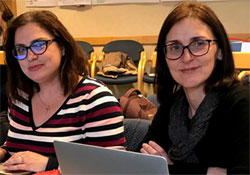Multicountry meeting produces drafts for evidence-informed policy on AMR

WHO
Representatives from 6 countries – Kazakhstan, Lithuania, Montenegro, Slovakia, Slovenia and the former Yugoslav Republic of Macedonia – met in Budapest, Hungary on 30–31 October 2017, to produce a set of draft evidence briefs for policies addressing issues of antimicrobial resistance (AMR) faced by their countries.
The event was jointly organized by WHO Europe’s Control of Antimicrobial Resistance Programme, Division of Health Emergencies and Communicable Diseases, and the Evidence-informed Policy Network (EVIPNet Europe) operating under the umbrella of the European Health Information Initiative, Division of Information, Evidence, Research and Innovation. The key objective of the event was to scale-up national efforts against AMR and close the research-to-policy gap in the WHO European Region. This was the first time a group of countries was invited to work together to draft country-specific evidence briefs for policies on AMR, summarizing the best available global and local evidence in a user-friendly format.
AMR is an increasingly serious threat to global public health that requires action across all government sectors and all levels of society. The 2-day workshop provided the unique opportunity for participants to propel their work forward in this area. The structure of the meeting ensured that attendees received dedicated time for each section of the policy briefs to be drafted, with technical support.
Participants also learned about developing communication plans and acquired a good understanding of how to organize and run efficient policy dialogues through participation in a mock policy dialogue session.
The face-to-face workshop allowed the group to capitalize on the experiences of other participants and benefit from their interactions with peers from EVIPNet Hungary, which was the first in the Region to develop an evidence brief for policy on AMR.
The event was opened by Szabolcs Szigeti, National Professional Officer on behalf of Ledia Lazeri, WHO Representative to Hungary; Tanja Kuchenmüller, interim Unit Leader, Knowledge Management, Evidence and Research for Policy-making, Division of Information, Evidence, Research and Innovation; and Saskia Nahrgang, Technical Officer, Antimicrobial Resistance, Division of Health Emergencies and Communicable Diseases from WHO Europe. The workshop was facilitated by Dr Rhona Mijumbi from the Regional East African Community Health Policy Initiative (REACH), Makerere University, Uganda.
This cross-divisional initiative supports both the adopted Global Action Plan on AMR and the Action Plan to Strengthen the Use of Evidence, Information and Research for Policy-making.
Planning to reduce AMR at national levels
The group’s next steps are related to finalizing their evidence briefs for policy on AMR by the end of 2017 and to planning for deliberative dialogues at the start of 2018, with the aim of influencing policy and reducing AMR at national levels.



